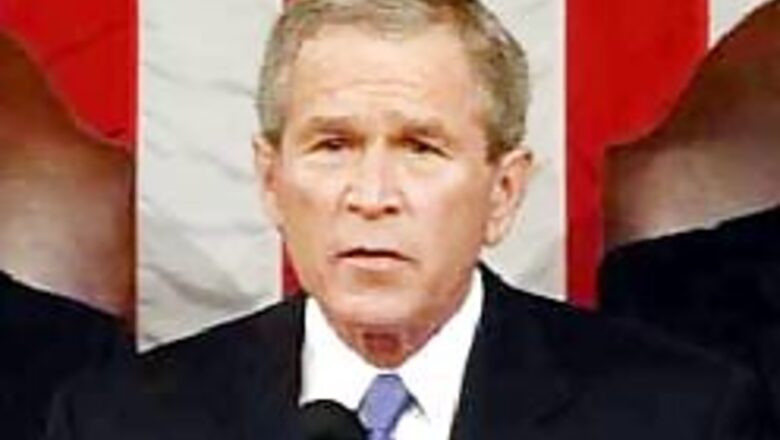
views
Washington A newly released transcript from a video conference the day Hurricane Katrina struck seems to reinforce arguments that governments at all levels identified the potential dangers from the storm but were under-prepared for the devastation.
In the transcript released Wednesday, Michael Brown, then-director of the Federal Emergency Management Agency, seems confident the emergency response is well in hand as he leads the August 29 briefing.
Brown praises Louisiana Gov. Kathleen Blanco and others for "doing a good job" and assures officials that President Bush, who was vacationing at his Crawford, Texas, ranch, is in close touch.
Hurricane Katrina, which had been a Category 5 storm a day before, hit the Gulf Coast near the Louisiana-Mississippi border early August 29, a Monday.
Bush has been accused of showing poor leadership after the disaster, and for indicating, along with Homeland Security Secretary Michael Chertoff, that no one could have anticipated that the flood protection system for New Orleans, Louisiana, would be breached.
However, transcripts from video conferences on August 28 and 29 show that National Hurricane Center Director Max Mayfield expressed concern that Katrina might push its storm surge over the city's levees and flood walls.
"I don't think anyone can tell you with confidence right now whether the levees will be topped or not, but that's obviously a very, very great concern," Mayfield says in one.
In a September 1 television interview, Bush said, "I don't think anyone anticipated the breach of the levees," a statement Chertoff agreed with three days later.
In an apparent effort to deflect criticism from the administration, Department of Homeland Security officials highlighted transcript parts that showed any weakness by local officials.
For instance, although some levees and flood walls failed early August 29, Blanco is unaware of this development during the midday briefing.
"We keep getting reports in some places that maybe water is coming over the levees. We heard a report unconfirmed. I think we have not breached the levee," Blanco tells the group.
Brown stresses that Bush is heavily involved.
"I talked to the president twice today, once in Crawford and then again on Air Force One," Brown tells those at the briefing. "He remains very, very interested in this situation.
PAGE_BREAK
"He's obviously watching the television a lot, and he had some questions about the Dome [Louisiana Superdome in New Orleans]. He's asking questions about reports of breaches. He's asking about hospitals. He's very engaged, and he's asking a lot of really good questions I would expect him to ask," Brown adds.
Bush, who participated in the August 28 FEMA briefing, reassures officials that everything is under control.
"I want to assure the folks at the state level that we are fully prepared to not only help you during the storm, but we will move in whatever resources and assets we have at our disposal after the storm to help you deal with the loss of property. And we pray for no loss of life, of course," he says.
Bush did not participate in the next day's briefing. By that time, 11 inches of rain had fallen in New Orleans, the massive storm surge had damaged the flood protection system and about 15,000 people were in the Superdome. That figure eventually doubled, leading to days of intolerable conditions before residents could be bused elsewhere.
The Senate Committee on Homeland Security and Governmental Affairs requested the video from the August 29 briefing in its investigation of the federal government's response.
Brown resigned September 12 after being recalled to Washington under a barrage of criticism over his job qualifications and FEMA's response to the disaster. Recently, he has accused the administration of using him as a scapegoat.
In response to the August 28-29 videotapes, the White House said Wednesday the briefings represented only a snapshot of what went on behind the scenes. Bush was fully engaged in emergency preparations, the White House said.
At the August 28 briefing, Brown tells Bush he is concerned that the roof of the Superdome -- the shelter of last resort for New Orleans -- would be unable to withstand a Category 5 hurricane.
Katrina weakened slightly as it approached the coast and was a strong Category 3 when the center of the storm made landfall southeast of New Orleans near Grand Isle, Louisiana.
Brown voices concern about the ability of national response teams "to respond to a catastrophe within a catastrophe." He says he had heard that there had been no mandatory evacuations of patients from hospitals and inmates from prisons.
PAGE_BREAK
On Wednesday, Brown's attorney, Andy Lester, said the most recently released tape "shows that Michael Brown was sounding the alarm" with the White House and the Department of Homeland Security.
"He was repeatedly saying move things forward, push the envelope, jump over the envelope," Lester said in a written statement.
"Michael Brown was on the job, was doing his job and was making sure people above him at the White House and DHS were fully aware of everything that was going on in an extremely timely and urgent manner," Lester said. "It paints a different picture than what we have seen painted thus far."
Sen. Joseph Lieberman, the ranking Democrat on the Senate committee, said the tape "demonstrates for all to see what our committee discovered during its investigation of the preparations for and response to Hurricane Katrina."
"Government at all levels was forewarned of the catastrophic nature of the approaching storm and did painfully little to be ready to evacuate, search, rescue and relieve," said the Connecticut lawmaker, who had accused the White House of stonewalling the committee.
More than 1,300 people were killed by Katrina in Louisiana, Mississippi, Alabama and Florida -- where the storm first hit August 25 as a Category 1 hurricane.
A special House committee concluded last month that the response to Katrina at all levels of government was dismal, poorly planned and badly coordinated, showing that "America is still not ready for prime time" more than four years after the September 11, 2001, attacks.



















Comments
0 comment